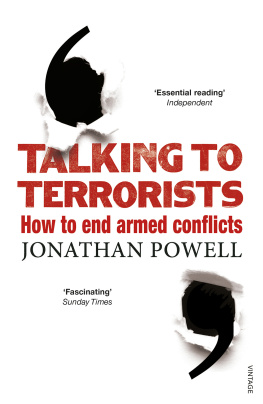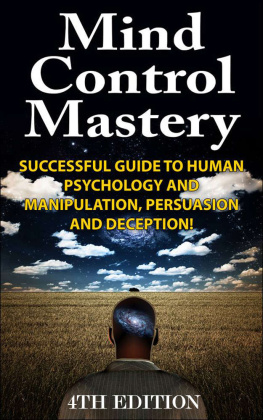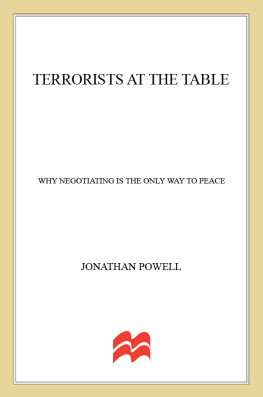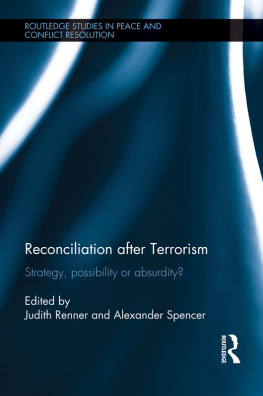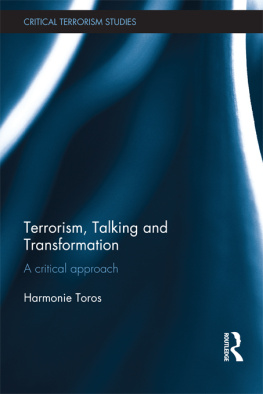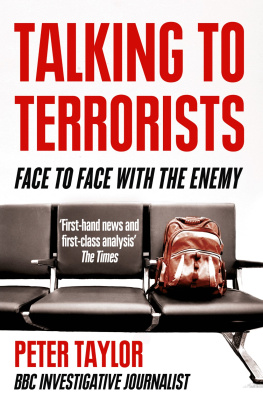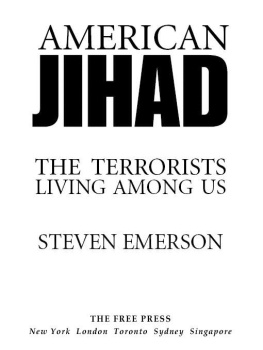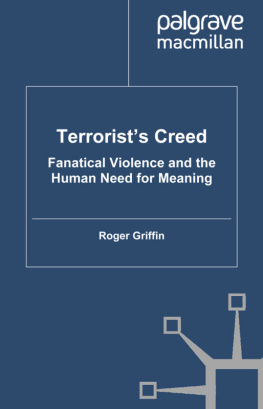About the Book
From jungle clearings to stately homes and anonymous airport hotels, Talking to Terrorists puts us in the room with those who seek to change the course of history. Here are the terrorists, secret agents and go-betweens who make up the invisible world of negotiations between terrorists and governments.
Across the world governments proclaim that they will never negotiate with evil. And yet they always have done and always will. Why then do we ignore the lessons of this history of clandestine communication, often with devastating consequences?
Jonathan Powell has spent nearly two decades mediating between governments and terrorist organisations. Here he argues that no conflict however bloody, ancient or difficult is insoluble. With attention to the lessons of the past, patience and above all political leadership, they can be solved, even where previous attempts have failed.
Talking to terrorists will always be practically difficult and morally hazardous. But it is the right thing to do. Drawing on conflicts from Colombia and Sri Lanka to Palestine and South Africa, this optimistic, wide-ranging, authoritative book is about why we should and how best to go about it.
About the Author
Jonathan Powell has spent half a lifetime talking to people and organisations labelled as terrorists.
He runs Inter Mediate, a London-based charity for negotiation and mediation that focuses on the most difficult, complex and dangerous conflicts, where other organisations are unable to operate.
In 1997 he met Gerry Adams and Martin McGuinness and became instrumental in negotiating peace in Northern Ireland. In 2008 he suggested publicly that western governments should open talks with the Taliban, Hamas and al-Qaeda. Today, he works on different armed conflicts around the world and is the UK Prime Ministers special envoy to Libya.
He is the author of two books, Great Hatred, Little Room and The New Machiavelli. He lives in London with his wife and two daughters.
ALSO BY JONATHAN POWELL
Great Hatred, Little Room: Making Peace in Northern Ireland
The New Machiavelli: How to Wield Power in the Modern World
Bibliography
Sources
1. Terrorism
Alonso, Rogelio, Leaving Terrorism Behind in the Northern Ireland and Basque Country: Reassessing Anti-terrorist Policies and Peace Processes, in Tore Bjrgo and John Horgan (eds), Leaving Terrorism Behind: Individual and Collective Disengagement (Routledge, Abingdon, 2008 )
Anderson, Jon Lee, Guerrillas: Journeys in the Insurgent World (Penguin, London, 2004 ; originally published 1992 )
Bew, John, Martyn Frampton and Inigo Gurruchaga, Talking to Terrorists: Making Peace in Northern Ireland and the Basque Country (Hurst, London, 2009 )
Bjrgo, Tore and John Horgan (eds), Leaving Terrorism Behind: Individual and Collective Disengagement (Routledge, Oxford, 2009 )
Burke, Jason, The9/11Wars (Allen Lane, London, 2011 )
Burleigh, Michael, Blood & Rage: A Cultural History of Terrorism (HarperCollins, London, 2009 )
Carr, Matthew, The Infernal Machine: An Alternative History of Terrorism (Hurst, London, 2011 )
Crenshaw, Martha, Explaining Terrorism: Causes, Processes and Consequences (Routledge, Abingdon, 2011 )
Cronin, Audrey Kurth, How Terrorism Ends: Understanding the Decline and Demise of Terrorist Campaigns (Princeton University Press, Princeton, 2009 )
Dershowitz, Alan, Why Terrorism Works: Understanding the Threat, Responding to the Challenge (Yale University Press, New Haven, 2002 )
Freedman, Lawrence (ed.), Superterrorism: Policy Responses (Blackwell Publishing, Oxford, 2002 )
Gray, John, Black Mass: Apocalyptic Religion and the Death of Utopia (Penguin, London, 2007 )
Hoffman, Bruce, Inside Terrorism (Columbia University Press, New York, 2006 )
Horgan, John, Walking Away from Terrorism: Accounts of Disengagement from Radical and Extremist Movements (Routledge, Oxford, 2009 )
Ignatieff, Michael, The Lesser Evil: Political Ethics in an Age of Terror (Princeton University Press, Princeton, 2004 )
Jones, Seth G. and Martin C. Libicki, How Terrorist Groups End: Lessons for Countering al Qaida (RAND Corporation, Santa Monica, 2008 )
Kilcullen, David, Counterinsurgency (Hurst, London, 2010 )
Law, Randall, Terrorism: A History (Polity Press, Cambridge, 2009 )
Reese, Phil, Dining with Terrorists: Meetings with the Worlds Most Wanted Militants (Pan Macmillan, London, 2005 )
Richardson, Louise, What Terrorists Want: Understanding the Enemy, Containing the Threat (Random House, London, 2006 )
Taylor, Peter, Talking to Terrorists: A Personal Journey from the IRA to Al Qaeda (HarperPress, London, 2011 )
Wilkinson, Paul, Terrorism versus Democracy: The Liberal State Response (Routledge, Abingdon, 2011 )
Articles
Abrahms, Max ( 2006 ), Why Terrorism Does Not Work, International Security, Vol. , No. , pp.
Abrahms, Max ( 2012 ), The Political Effectiveness of Terrorism Revisited, Comparative Political Studies, Vol. , No. , pp.
Cronin, Audrey Kurth ( 2006 ), How al-Qaida Ends: The Decline and Demise of Terrorist Groups, International Security, Vol. , No. , pp.
Hoffman, Bruce ( 2013 ), Al Qaedas Uncertain Future, Studies in Conflict & Terrorism, Vol. , No. , pp.
Jones, David Martin and M. L. R. Smith ( 2009 ), Were All Terrorists Now: Critical or Hypocritical Studies on Terrorism?, Studies in Conflict and Terrorism, Vol. , No. , pp.
Kalyvas, Stathis N. ( 2003 ), The Paradox of Terrorism in Civil War, Journal of Ethics, Vol. , No. , pp.
Lia, Brynjar ( 2008 ), Al-Qaidas Appeal: Understanding its Unique Selling Points, Perspectives on Terrorism, Vol. , No.
Stevenson, Jonathan ( 2001 ), Pragmatic Counter-Terrorism, Survival, Vol. , No. , pp.
News
The Unquenchable Fire, The Economist, September 2013
Other
Canadian Security Intelligence Service, The Future of Al Qaeda: Results of a Foresight Project ( 2013 )
Director Generals Speech at RUSI, 2013 , www.mi5.gov.uk, October 2013
Homeland Security Advisory Council ( 2007 ), Report of the Future of Terrorism Task Force, http://www.dhs.gov/xlibrary/assets/hsac-future-terrorism-010107.pdf
Remarks by the President at the National Defense University, www.whitehouse.gov, May 2013
2.Conflict resolution
Butler, Michael J., International Conflict Management (Routledge, Abingdon, 2009 )
Dudouet, Veronique, Hans Giessmann and Katrin Planta, Post-war Security Transitions: Participatory Peacebuilding after Asymmetric Conflicts (Routledge, Abingdon, 2012 )
Hampson, Fen Osler, Nurturing Peace: Why Peace Settlements Succeed or Fail (United States Institute of Peace, Washington DC, 2005 )
Holbrooke, Richard, To End a War (Modern Library, New York, 1999 )
Martin, Harriet, Kings of Peace, Pawns of War: The Untold Story of Peacemaking (Continuum, London, 2006 )
Ramsbotham, Oliver, Transforming Violent Conflict: Radical Disagreement, Dialgoue and Survival (Routledge, Abingdon, 2010 )
Ramsbotham, Oliver, Tom Woodhouse and Hugh Miall, Contemporary Conflict Resolution (Polity Press, Cambridge, 2011 )
Van Engeland, Anisseh and Rachael M. Rudolph,

